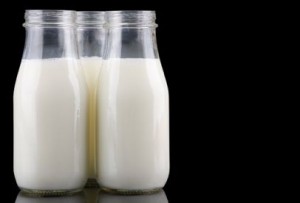 Washington state dairy is voluntarily recalling certain milk and cream products because they were not adequately pasteurized.
Washington state dairy is voluntarily recalling certain milk and cream products because they were not adequately pasteurized.Pure Eire Dairy of Othello, WA issued a recall of its organic pasteurized non-homogenized skim, reduced fat 2% milk, and whole and heavy cream milk products bearing the expiration dates of 5/15/13, 5/18/13 and 5/20/13 Monday.
The recall is based on what the dairy describes in its press release as “improper pasteurization” of the milk and milk products with the specified expiration dates.
The recalled pasteurized milk products, which are sold in plastic and glass 8 oz, 1/2 gallon and 1 gallon containers, include:
• Organic Heavy Cream Pasteurized, in 8oz and ½ gallon plastic containers
• Organic Pasteurized Skim Milk, non-homogenized, ½ gallon plastic and/or glass jug
• Organic Pasteurized Skim Milk, non-homogenized, 1 gallon plastic jug
• Organic Pasteurized Reduced Fat 2% Milk, non-homogenized, ½ gallon plastic and/or glass jug
• Organic Pasteurized Reduced Fat 2% Milk, non-homogenized, 1 gallon plastic jug
• Organic Pasteurized Whole Milk, non-homogenized, ½ gallon plastic and/or glass jug
• Organic Pasteurized Whole Milk, non-homogenized, 1 gallon plastic jug
According to the dairy’s press release, “legal pasteurization” of the milk was not achieved because during processing, the airspace above the milk failed to reach the proper pasteurization temperatures.
Pasteurization is a process in which milk is heated to specified temperatures (according to the method of pasteurization used) to kill harmful illness-causing bacteria such as E. coli and Campylobacter.
The problem at the dairy was detected and corrected during an inspection by the Washington State Department of Agriculture on May 10, 2013, according to the dairy’s press release.
As of the evening of May 13, there had been no reports of human illnesses associated with these pasteurized products.
The recalled milk was sold in Western Washington, the Tri-Cities, Walla-Walla and Spokane. The dairy encourages customers who bought any of the products subject to the recall to return them to the place where they bought them for a full refund.
The recall does not include the dairy’s raw milk products.
Local health jurisdictions in Washington state are not being asked to participate in any formal recall verification activities at this time, but appropriate staff should be aware of the recall, advises the state’s Health Department.
How was the milk pasteurized?
Like many small-scale producers, Pure Eire Dairy uses a process known as “vat pasteurization.” In that process, the milk is held at 145 degrees F (62.8 C) for 30 minutes and then quickly cooled.
While that may sound like a relatively simple process, FDA inspectors, while conducting tests as part of the Dairy Initiative Program, found some problems with vat pasteurization, among them improper equipment design and improperly operated airspace heaters.
That latter problem is critical, according to information about this topic in the book Listeria, Listeriosis and Food Safety, published by the CRC Press, because air temperatures above the product in the vat must be kept at least 5 degrees F (2.8 degrees C) higher than the product at all times to make sure the milk or cream is properly pasteurized.
In an interview with Food Safety News, dairy co-owner Richard Smith said that the dairy was pasteurizing the milk at 150 degrees F in the three instances in which the state detected a problem.
“We were under the impression that the air temperature was OK because the milk was held at 150 degrees,” he said.
Even so, the dairyman said that “out of an abundance of caution,” the dairy decided to recall the pasteurized products produced during the three occasions when the air temperature above the milk in the vat was not 5 degrees higher than the milk in the vat.
“We have a loyal customer base. We want to be up front with them,” he said.
Like others who prefer vat-pasteurized milk, Smith said the process leaves the milk less damaged than when it’s pasteurized under a commonly used process known as ultra-high-temperature (UHT) pasteurization. Under UHT, which is used by many of the large processors, the milk is heated to 275 degrees F (135 degrees C) for about 1 to 2 seconds.
Advocates of vat pasteurization say that vat-pasteurized milk has a better taste and texture than milk pasteurized using UHT. In addition, they say it can be used to make products such as yogurt, cheese and keffir, because the enzymes in the milk haven’t been destroyed, as they are when milk is pasteurized using UHT.





